
Overcoming fear by having hope
It is common to hear in everyday life, there is no way, everything is really lost, in difficult days for all humanity, it seems impossible to believe in a future full of light and happiness, however, both in philosophy and in true spirituality there is a spirit of resistance: the hope.
no way, everything is really lost, in difficult days for all humanity, it seems impossible to believe in a future full of light and happiness, however, both in philosophy and in true spirituality there is a spirit of resistance: the hope.
So many times in history we seemed close to the end, the ancient empires, the great wars and the two recent “world wars” are not a mere chance, and they were also not without a lot of death, sadness and disappointment, but the worst thing is that we did not have the lucky to understand that scourge.
We don’t know how to deal with pain, with disappointment, with “no” and we want at all costs to be the winners in any dispute, even sporting ones that should only be a reason for joy and distraction, can become a war due to the lack of healthy spirit of competition.
In Palliative Society: Pain Today, Byung Chul-Han writes: “The palliative society is a society of enjoyment. It degenerates into a mania of enjoyment. The like is the sign, the painkiller of the present. It dominates not just social media, but all spheres of culture. Nothing should cause pain”, we want something that will immediately “cure” or suppress any pain or even a small amount of suffering.
The author creates a verb based on new media: “Not only art, but also life itself has to be Instagrammable; that is, free from angles and corners, from conflicts and contradictions that could cause pain. We forget that pain purifies”, and fear brings light to consciousness.
How to beat him? Have you ever stopped to try to answer this question? with Hope, not that of those who wait and do nothing, but that of those who stop and meditate on pain, also on those who suffer injustices, judgments and who should occupy our consciences.
The resistance of the Spirit, which Edgar Morin advocates for today, is also a spirit of Hope, because spiritual exercise would be worthless without a belief in a better future for all, of peace, justice and acceptance. the differences.
In the biblical narrative, when the disciples saw the resurrected Jesus “walking on the sea”, they were afraid and did not fully understand his iconic meaning, but the master said (John 6:19): “Take courage, it is I”, and approaches them , a new force came precisely after this “fear”.
Infinity is not just “believing”
Having moral and religious concepts does not always mean that we overcome fear, anguish and the difficulties of life, fervent prayers and preaching can cover up the truth, this keeps many people away from believing in happiness and eternal life.
always mean that we overcome fear, anguish and the difficulties of life, fervent prayers and preaching can cover up the truth, this keeps many people away from believing in happiness and eternal life.
When something from the infinite touches us in life, not only do we discover the truth, not only a belief in someone (something is to reify the eternal) who is already part of our existence, this invigorates us and makes us capable of helping the world of peace, of hope and true Love.
We know in our hearts that no one can truly probe and know our soul, however, someone peers into our interior, when we love and do something good for others, for ourselves and for humanity, something good invades our being and gives us serenity.
This strength that awakens within led great sages, masters and saints to discover something new that made them progress in true asceticism, they were capable of heroic attitudes, but curiously with less weight than it would be for men who do not know this Love.
When we truly live this dimension, even a certain type of routine and bureaucratic religiosity abandons us, we want to see the Other grow, we want to listen to them and love them as they are.
This way we overcome fear with positive attitudes towards the world and other people, so that what is really True, that is, the human and divine good within us, also manifests itself outside and there is no fear, no anguish because it is a True Good.
The opposite, the constant opposition to the Other, the feeling of always highlighting the difference and the arrogance of being superior in something we do well or better than others, although it seems true, brings with it a feeling that distances us from the Other and from humanity, It is not peace.
If we look at wars, we will always see this principle, seeing others as inferior and smaller than us, so they are not worthy of living, they “deserve” all the evil that is deep down within us and not in these people, the majority of whom are innocent, even if Within each people or nation there are people who would not be worthy of our good wishes, it is not by eliminating them that we build peace.
True peace among men is born from a serene heart, which understands the infinite, and which longs, even in the distant future, for a better life for all, without injustice and wars.
Happiness, fear and serenity
Among the main guests of “Fronteiras do Pensamento” is Luc Ferry, still little known in Brazil, and already with a certain exponent in Europe he also spoke about fear, one of our themes this week.
Pensamento” is Luc Ferry, still little known in Brazil, and already with a certain exponent in Europe he also spoke about fear, one of our themes this week.
He defends a secular spirituality, which for me and other Christians is fragile, but some of his reasoning and comments are important, for example about happiness: “… it does not exist, we have moments of joy, but there is no permanent state of satisfaction… What we can hope for is serenity, something completely different. Serenity can only be achieved by overcoming fear” (interview with Fronteiras do Pensamento).
It classifies fear into three types: shyness (arises depending on the environment and society), phobia (fear of the dark, insects, being trapped in an elevator), in our view it is the only one that really encompasses itself within what the author works mainly: psychology, and the third is the fear of death (of the people we love and of our own death), in our view this necessarily refers to the finitude of life and man, it is only possible to transcend with a spirituality not secular.
He cites an important author, Hans Jonas, and his book The Principle of Responsibility, where there is a chapter called Heuristics of Fear, described as a positive and useful passion.
Through reading this author gives a positive reading: “Ecology inverts this philosophical tradition by maintaining that fear is the beginning of a new wisdom and that, thanks to fear, human beings will become aware of the dangers that exist on the planet. Fear is no longer seen as something childish, but as the first step on the path to wisdom.”
If we are not afraid of war, of an atomic catastrophe, of a desertified planet, of the hunger already present in poor people and countries, we will not have social responsibility, most of us (who do not experience these fears) imagine that they will never be affected, however it’s not like this.
He recognizes that religion also addresses this issue, but his secular spirituality states that: “except that the great philosophies are doctrines of salvation without God and without faith”, so the question remains how to overcome finitude and death, and whether the resurrection of Jesus is true?
Of course it is a question based on faith, but the men of that time saw, witnessed and gave testimony, so why not bet on faith as Pascal proposed, what would you lose with this “bet”, of course it is important to go further, but it could be a first step.
What do I gain today with this bet, is a simple answer, more peace and more conviction of the possibility of peace, of not needing to destroy to discover that we chose death and fear?
Luc Ferry – A boa vida – YouTube
Fear, society and hope
Fear is not something of these days and perhaps of contemporary society, it is not, however, something transitory or even impossible to be overcome.
of contemporary society, it is not, however, something transitory or even impossible to be overcome.
In different societies and thoughts they were elaborated, in ancient classical thought
It is a mistake to think that tiredness, pressure and fear are current problems, they have been present in our society for some time: competition and the demand for perfection are present in the history of humanity.
Heidegger (1889-1976) stated this way (not literal here): fear invites us
living in impropriety, we don’t attribute meaning, we let others and circumstances attribute it, we alienate ourselves from ourselves, we always live on the run, with our schedules full of distractions that occupy us.
For some, it is a more phenomenological and practical way of seeing fear, as Pascal and Kierkegaard would have a more theological fear, but there is a theological mistake “fear of God” is not necessarily a fear, but rather respect, after all the first Christian commandment is to love God above all things.
So seeing fear as a “thing”, the phenomenological sense of Heidegger and others does not suppress the theological vision, a thought limited to man will also limit his existence to this world being a limited intellect.
Kierkegaard’s work “The Concept of Anguish”, remembering that we made a post about this, has a demand for questions, many are asked in relation to the “fear of death”, which in a certain sense is a fragile theological issue, whereas Pascal’s work There is also a tendency to “take a chance on God”, when thinking about the soul.
The philosopher says: “The immortality of the soul is something that worries us so much, that touches us so deeply, that we must have lost all feeling to remain indifferent before it.”, he does not, therefore, affirm its immortality, but rather in the face of doubt.
For Heidegger, it is more than a psychological and ontic phenomenon; it has an ontological dimension, as it refers us to the totality of existence as being-in-the-world, but anguish man only exists if he can have an understanding of Being, although he does not say so, it is a reality beyond “thing”, Hannah Arendt, his disciple, will say beyond the vitta activa.
The contemplative vitta (see also Byung-Chul Han) leads us to awareness of the Being, it is a path to overcoming fear and anguish.
Eminent danger of war and hope for peace
A drone attack on the Zaporizhzhia plant last week triggered an alert from Russia that promptly denounced the danger and consequences of a nuclear disaster would be dire.
week triggered an alert from Russia that promptly denounced the danger and consequences of a nuclear disaster would be dire.
It was not clear exactly what weapon was used against the nuclear plant (photo), only that they were drones and that one had been detonated on site. The International Atomic Energy Agency (IAEA), which has experts on site, said only that the information was “consistent” with the entity’s observations, that is, a drone had exploded near the Plant.
International analysts still see the conflict as unlikely due to the catastrophic risk due to the possibility of using nuclear weapons, in addition to conventional combat, the use of cyber and hybrid attacks would be put into motion, initially in Eastern Europe, but with the risk of expanding to Europe and other continents.
Even though NATO holds a significant advantage in both geopolitics, Finland and Sweden joined NATO and Hungary, which sought a position of neutrality, is now strengthened with a military technology agreement made with Sweden, which facilitated its entry into NATO.
Russia, however, has military capabilities combined with economic resources and the modernization of its military apparatus, in addition to a support agreement with China and North Korea, so maintaining peace and preventing conflicts must be done through constant dialogue, but Russian diplomacy continues to play hard and says that dialogue with NATO is “zero”.
Both Russian Foreign Minister Sergey Lavrov and Kremlin spokesman Dimitry Peskov make statements that imply that the conflict with NATO is already underway, diplomatic strategy or pure rhetoric, the fact that tension levels are rising .
NATO responds with military exercises and troop movements on the borders, in January an exercise involved 90 thousand soldiers, new training was announced by NATO commanding general, Christopher Cavoli, the operation called Defensor Firme 24 (Steadfast Defender 24) had already been carried out in other years, but now it takes place amid an intensification of bombings against Kiev.
The hope is that the balance is fragile and both sides know this, and the risk of war would be catastrophic, even though analysts avoid saying that there would be limits on actions.
Polycrisis and hope
Rumors of confrontation between Russia and NATO have worsened in the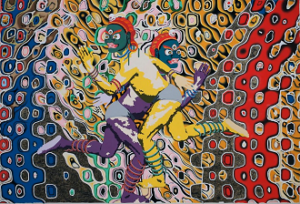 last few hours, however, the hope for peace and the resistance of the Spirit, as portrayed by Edgar Morin, remain alive.
last few hours, however, the hope for peace and the resistance of the Spirit, as portrayed by Edgar Morin, remain alive.
In addition to Morin’s polycrisis (just as poly is multiple and is also city polis, Krisis also has the meaning of decision-making power) professor Adam Tooze (Financial Times article), of history at Yale University (USA) expanded and updated: pandemics, droughts, floods, mega storms, forest fires, war in Ukraine (and now in the Gaza strip0, energy and food prices, etc.
In his reasoning, without directly pointing out the professor “discovers” the complexity and a new transdisciplinary vision of the “whole”: “A problem becomes a crisis when it challenges our ability to deal with it and, thus, threatens our identity. In a multiplicity of crises, the shocks are differentiated, but they interact in such a way that the whole is more ambiguous than the sum of its parts”, he states in the article. (in the image the painting by Tsherin Sherpa (Nepal), Lost Spirits, 2014.)
Morin said: “Linked to the domain of calculation in an increasingly technocratic world, the progress of knowledge is incapable of conceiving the complexity of reality and in particular human realities. The result is a return to dogmatism and fanaticism, and a crisis of morality while hatred and idolatries spread” (Newspaper La Repubblica, interview), however, beyond the polycrisis there are signs of hope.
While the Resistance of the Spirit invokes an understanding of the gravity and issues surrounding the current crisis, Hope (capitalized here) means this Spirit put into action and thus the achievement of a countercurrent spirituality that invokes values of change.
Those who immerse themselves in this Hope in different ways, are always willing to embrace the problems that everyone runs away from, to embrace the fragments of a polarized world, and to remember what unites as opposed to what disunites and polarizes, fortunately there are these spirits and I would call them Spirits of Resistance through Hope.
Go to the World and Bring the Good News, it cannot just be a biblical key, it is Living Hope.
Substance and the essence of Being
Substance is an essential concept of both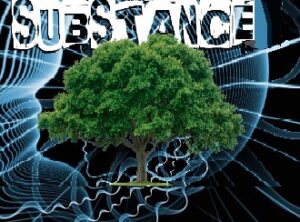 metaphysics and ontology, although modernity wants to characterize it only as that which is material, etymology says sub instance, or from Latin it literally means “what is below”, but it can also be “ derived from”.
metaphysics and ontology, although modernity wants to characterize it only as that which is material, etymology says sub instance, or from Latin it literally means “what is below”, but it can also be “ derived from”.
Dualism sees everything as opposition and affirmation, a primary substance is one that does not have the opposite disposition, for example, a man, a tree or an animal, its opposite does not exist, but it is not yet what designates Being, since these change, they are born with some original form and later modifying they are the foundation of something “derived”: an accident, a sub-instance of man, tree or some animal.
In the 17th century René Descartes proposed a division between body and mind, dividing substance into two categories: res extenso, which refers to physical matter, and res cogitans which refers to mind or thought, the simplified dualism as body and mind , in this century there were opposing ideas: the “atomist” monism of Leibniz and the natural monism of Spinoza.
In the 18th century, this idea underwent two reforms: Hume’s, who criticized the substance as something essential, being just an idea created by the human mind, to give meaning to experience, and Kant’s idealism, the substance is not a thing in itself, but a category of human understanding.
Still within the limits of Kantianism, there remain two possibilities of conceiving a being or an object, the immanent sense, which remains within the scope of possible experience, but acting only through the senses (concepts or cognitive principles) and the transcendent, which admits an immanent god , which permeates all reality and is not separated from matter.
The transcendent is then what takes the subject (hence it is called subjectivity) to the object (objectivity) allowing the concept or cognitive principle.
The idea of a person, or three people in the Christian case, is one that gives being (does not separate it from the object and experience) its transcendence and thus allows spiritual ascesis.
In the Christian case, I draw attention to the Resurrected Jesus who orders and roasts a fish and eats it, not out of necessity, but out of possibility, so he does not affect the substance although he conceives it.
The passage says (Luke 24, 40-43): “And saying this, Jesus showed them his hands and feet. But they still couldn’t believe it, because they were so happy and surprised. Then Jesus said, “Do you have anything to eat here?” They gave him a piece of roasted fish. He took it and ate it before them”, if he didn’t need it because he ate it, remember the last supper.
Me, the Other and the Hidden Third
The principle of uncertainty that came from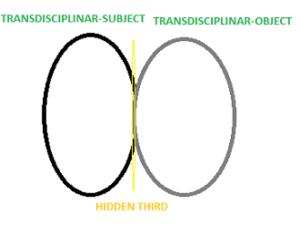 physics, starting with Heisenberg, at the beginning of the last century gradually put Physics in check, putting scientific determinism, logicism also in check due to Gödel’s paradox which determined that an axiological mathematical system or it is complete or consistent, and cannot be both at the same time, but a new scientific and ontological vision was emerging, Transdisciplinary Ontology.
physics, starting with Heisenberg, at the beginning of the last century gradually put Physics in check, putting scientific determinism, logicism also in check due to Gödel’s paradox which determined that an axiological mathematical system or it is complete or consistent, and cannot be both at the same time, but a new scientific and ontological vision was emerging, Transdisciplinary Ontology.
In the week of July 13 to 17, 2008, the 9th. The Metanexus Institute’s annual conference, held in Madrid, Spain, between philosophers, biologists, physicists, cosmologists, neuroscientists, cognitive scientists, historians, educators, theologians and community leaders took place with the theme “Subject, self, and Soul: Transdisciplinary approaches to Personhood”, where Barsarab Nicolescu was invited to open the Conference.
In it Nicolescu will develop the idea of the hidden third, philosophy had already spoken of the Other through Lévinas, Ricoeur and the educator Martin Buber, who in the book “I-Thou” recognizes in the other something “divine”, but stops there as the others, stop at the edge of the concept of otherness.
Nicolescu went ahead, writes like Heisenberg a model for overcoming the subject x object dualism, characteristic of modernity: “: “We can never reach an exact and complete portrait of reality (Heisenberger, 1998, p. 258). The incompleteness of the laws of physics is present in Heisenberg, even if he makes no reference to Gödel’s theorems. For him, reality is given as “textures of different types of connections”, as an “infinite abundance”, without any ultimate foundation” (Nicolesceu, 2008)
Citing Heisenberg, Nicolescu states, citing Husserl, Heidegger, Gadamer and Cassirer (whom he knew personally), that it is necessary to suppress any rigid distinction between Subject and Object.
The idea of the hidden subject in Nicolescu is beyond the threshold I and the Other, it is in the conception that comes from physics that there is a third state in nature, the Third Included beyond Being and Non-Being, he calls them the Transdisciplinary-Object and Subject-Transdisciplinary, in quantum physics it was already clear that the analysis of an Object phenomenon must be transdisciplinary due to a then unknown state in nature, now also a Transdisciplinary Subject is described by Nicolescu (calls it TD-Subject) which reveals the Hidden Third.
Although the theme talks about the soul and even talks about spirituality, for a good biblical reading it is necessary to understand the unveiling of Jesus after his death (appearance is a limited term) which reveals itself in a surprising and divine way to the disciples, the Hidden Third is Himself.
In the passage of disciples who are walking to Emmaus and a Third walker infiltrates among them, when they see the breaking of bread they will soon remember their “conversation”: “Then one said to the other: “Wasn’t our hearts burning when he spoke to us along the way, and explained the Scriptures to us?” (Luke 24:32).
Quantum physics, occult third and spirituality
Nicolescu Barsarab, in addition to formulating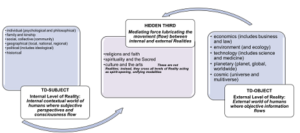 the theory of the included third, substantiating through quantum physics that Aristotle’s principle of the excluded third, there is A or non-A being exclusive, however quantum physics had already revealed a third state T, as a combination between the state of “existence” and “non-existence” as a physical state, this Being existing or not as a third state allows us to speak of a Transdisciplinary Ontology.
the theory of the included third, substantiating through quantum physics that Aristotle’s principle of the excluded third, there is A or non-A being exclusive, however quantum physics had already revealed a third state T, as a combination between the state of “existence” and “non-existence” as a physical state, this Being existing or not as a third state allows us to speak of a Transdisciplinary Ontology.
Succinctly, Nicolescu (2002) developed is that instead of one reality waiting to be discovered using the scientific method, there are multiple levels of Reality (he capitalizes Reality and uses the letter T for transdisciplinarity) organized into two levels.
One level concerns Subjective Reality (TD-Subject), so called because it deals with the internal flow of perspectives and consciousness. Included are individual psychology and philosophy, family, community, society, history and political ideologies. The other level concerns Objective Reality (TD-Object), so called because it deals with the external flow of information, facts, statistics and empirical evidence.
Examples include economics (business and law), technology, science and medicine, ecology and environment, planetary (worldwide and global), and cosmic and universe (Nicolescu, 2002, 2016).
Each level of Reality is different, but “each level is what it is because all levels exist at the same level”, the existence of a single level of reality, the disciplinary closure of knowledge, Edgar Morin also warns about this, creates a new type of obscurantism, of disciplinary closure in areas of knowledge.
Arrábida Transdisciplinarity Charter says in its preamble: “Considering that the contemporary rupture between an increasingly cumulative knowledge and an increasingly impoverished inner being leads to the rise of a new obscurantism, whose consequences, on the individual and social level, are incalculable ”, and says in his third article: “Transdisciplinarity is complementary to the disciplinary approach; it makes new data emerge from the confrontation of the disciplines that articulate them together; offers us a new vision of the nature of reality” (Arrábida, 2014).
The opening to the subject is not just about idealistic subjectivity, it is the opening to Being itself and what Transdisciplinary Ontology proposes is to see it in the complexity that is revealed.
Nicolescu, B. (2002) Manifesto of transdisciplinarity. New York, NY: SUNY Press.
Nicolescu, B. (2016) The Hidden Third [W. Garvin, Trans.]. New York, NY: Quantum Prose, 2016.
Freitas, L., Morin, E., Nicolescu, B. (1994) Portugal, Convento da Arrábida, november, 16, 1994.
Pre-war and hope for peace
Russia declared a state of war with Ukraine,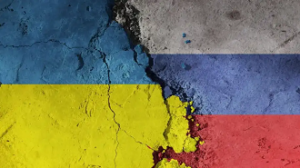 what changes are the methods and an increase in the limits of violence, the tactic is to bomb the entire country and especially the installations that supply energy, of course except the Atomic Power Plants, but it is not free from an “accident” that would be a severe blow across Europe.
what changes are the methods and an increase in the limits of violence, the tactic is to bomb the entire country and especially the installations that supply energy, of course except the Atomic Power Plants, but it is not free from an “accident” that would be a severe blow across Europe.
Ukraine in response has made incursions into Russia mainly to target oil plants and deposits, which is why the attack on Crimea has been strategic, and also why Russia has warned that it will not attack NATO forces, except F-fighters. 16.
In addition to Macron, who declared that he does not rule out, if necessary, sending troops to Ukraine, Polish Prime Minister Donald Tusk also warned that Europe is in a “pre-war” although he added that there is a “long way to go before facing the “threat” posed by Russia.
Polish Prime Minister Donald Tusk warned that Europe is in a “pre-war era” but still has a “long way to go” before it is ready to face the threat posed by Russia.
The recognition by most European governments that a war with Russia would not be simple is a brake on warmongering threats and opens a path to peace. There are already barely visible articulations in the mainstream press of attempts at agreements, which are seen as “secret ”, but it is not the truth, political and economic interests also act in this area.
The situation of humanitarian calamity and war remains between Israel and neighboring anti-Semitic forces, there is a danger that this feeling will become normalized where only the Palestinian side is emphasized, of course the people are never to blame for the war of the powerful, the Russian and Ukrainian people are also victims , but extreme warlike actions must be charged and punished.
The resistance of the spirit, a word coined by Edgar Morin, must be present in our minds and attitudes, ideological and cultural polarization throughout the world (the terrorist act in Russia has cultural connotations, it seems), must not feed our spirit.
We always hope for serenity, the recognition that everyone loses in a war, especially the innocent and civilians, but it feeds a powerful war industry that serves a perverse economy and hardens spirits.
For Christians, Easter is the victory over death, over hatred, it is a victory of peace.

